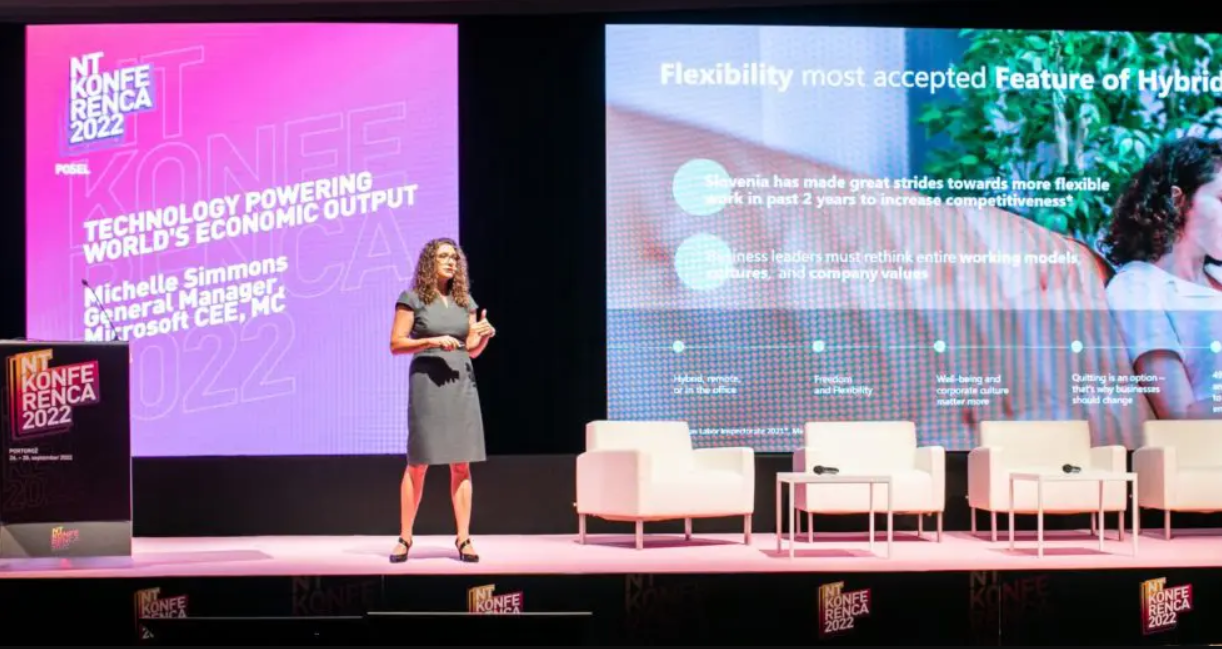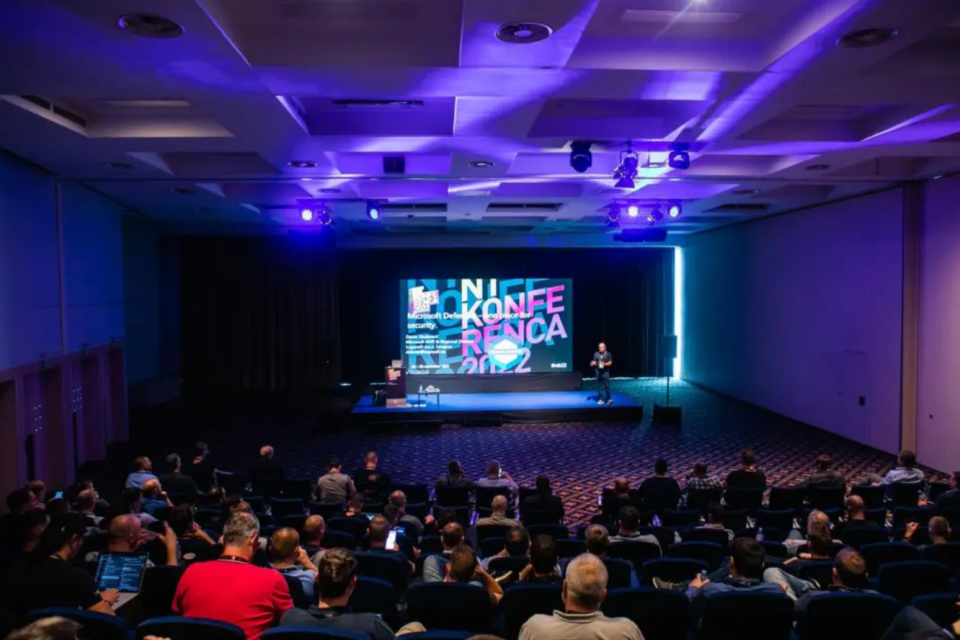The largest Slovenian business and technology event, NT Conference, took part from the 26th to the 28th of September in Portorož and was attended by more than 1600 participants, who participated in more than 130 lectures and practical workshops on the latest digital technologies and Microsoft solutions. The 27th edition of the conference was focused on the recovery of economies and sustainable growth in challenging geopolitical and economic environments, the interaction of technology and society, including a particularly timely topic of cybersecurity, and the opportunities for digital and green transformation at home and around the world.
Turning point with great opportunity and responsibility
“The world is at the crossroads of enormous change: geopolitical, economic, social, and technological. This puts us at a historic turning point where exceptional opportunities face just as much responsibility to the world around us. We have demonstrated that we can adapt and grow,” Michelle Simmons, Microsoft’s GM for CEE Multi-Country, said in an opening address. “We are entering a new era where every organization will become a digital organization, and every nation will become a digital nation.”

“Slovenia is accelerating its path of digital transformation. It is one of the leading European countries in digitizing education and in the top 10 in the integration of digital technologies into business. The share of companies using cloud services is 38 percent, which is above the EU average. A key priority for Slovenia is, therefore, the digitization of public services, which will encourage citizens to make further use of modern technologies to strengthen their competences in real time,” added Simmons, who also highlighted the increased role of cybersecurity in current situations:
“Only a few years ago, we saw cybersecurity as a technical issue that is being addressed by IT professionals. Today, we see that this is one of the key challenges and threats to the very existence of organizations. With more than 8,500 security experts in 77 countries around the world and a trillion of security signals, Microsoft provides the most comprehensive overview of the current security situation. We protect our cloud customers with us. There is no isolated system in a connected world.”
“Government institutions and public sector clients want to accelerate their digital transformation in a safe way in order to create opportunities for social and economic development and improve services for citizens. By investing in research and innovation, we are developing Microsoft Cloud for Sovereignty, the most flexible and comprehensive digital sovereignty solution that will enable public sector customers to create and digitally transform their tasks in the Microsoft cloud while meeting their regulatory compliance, security, and policy requirements. The upcoming EU Data Boundary plan will ensure that Microsoft not only stores but also handles customer data within the European Union. We look forward to working closely with partners around the world to help government clients with a digital transformation that will ensure data sovereignty and the protection of national assets.”
Slovenian IT needs more women
In her opening address, Barbara Domicelj, director of Microsoft Slovenia, highlighted areas that will need to be given more attention in terms of accelerating Slovenian digital development: more flexible forms of work and representation of women in the IT industry.
“According to LinkedIn, in March 2020, the ratio between the posts with remote work option and those without it was 1 in 67. Two years later, that ratio was already 1 to 7. Job ads with remote work get 2.5 times more views and attract three times more applications from candidates,” said Barbara Domicelj. “In order for companies to meet these expectations, a shift in mindset is needed, building on the experience of the last two years. Successful companies will therefore be the ones who create a culture of flexibility and understand that this is their key competitive advantage and engine of long-term growth.”
“The other area where we need to do more is gender balance. In Slovenia, we like to boast about the high participation of women in the labor market. But Microsoft’s Digital Futures index revealed that this is not the case in the IT industry, as the proportion of women among IT professionals is below average. Slovenian companies also employ fewer ICT professionals than the regional average. Still, they are also more difficult to obtain because of the below-average share of graduates educated in ICT occupations. To accelerate digital development, we will need to address this gap between the needs of businesses and the labor market situation as quickly as possible – by inspiring more women to pursue ICT careers.”
Sustainability is new digital
Mark Kroese, Microsoft’s General Manager for sustainable solutions, presented Microsoft’s sustainability goals. The company plans to become a carbon negative, water positive (restoring more water than it consumes) and zero waste till 2025 and build a Planetary Computer to help monitor, model and manage Earth’s natural systems.
Petra Čiček, Sustainability & Country Cloud and AI Lead for Central and Eastern Europe in Microsoft, took part in Open Knowledge Society panel, where she shared her views on education, skilling and growth mindset.
The conference offered participants a chance to learn about innovations from a full range of IT technologies such as artificial intelligence and machine learning, mixed reality, server infrastructure, databases and business analytics, computer security, and the latest Microsoft products and services.





